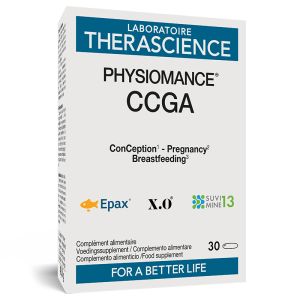
Planning a baby? Periconception, pregnancy and breastfeeding: don't neglect the importance of micronutrition!
Women's well-being
Despite the great abundance of food in industrialised societies, knowledge about dietary intakes of trace elements, vitamins and essential fatty acids has made it possible to estimate the risks of micronutritional deficiencies in the apparently healthy population of women of childbearing age, pregnant and breastfeeding women. Indeed, a significant proportion of these women receive intakes below the recommendations, and/or present biological signs of sub-deficiencies. These deficiencies have consequences in terms of public health, as the biological properties of micronutrients and unsaturated fatty acids (omega-3) give them essential roles in the physiological situations of periconception, pregnancy and breastfeeding. Meeting the qualitative and quantitative needs for micronutrients and essential fatty acids therefore appears to be a priority objective in this population1.
Periconception
In the female population of childbearing age, national and European epidemiological surveys agree in describing deficiencies in the intake and status of folates, group B vitamins, omega-3 fatty acids, vitamin E and zinc. These deficiencies can have significant consequences at the time of fertilisation
The absolute necessity of an optimal folate (vitamin B9) status is related to its physiological role. Folate deficiencies in women of childbearing age are a consequence of inadequate dietary intake and increased requirements. In young women, in addition to the consumption of low-calorie diets that are often unbalanced and not very diversified, hormonal contraception, smoking and alcohol consumption increase these needs. It is therefore imperative to plan for supplementation as soon as pregnancy is in prospect, in order to ensure that the first few weeks after conception, women have the optimal status necessary for the early stages of foetal development2.
Similarly, a sufficient intake of the omega-3 fatty acid DHA (docosahexaenoic acid) is essential to optimise the mother's nutritional intake before pregnancy and to strengthen her reserves of omega-3 fatty acids.Other B vitamins such as vitamin B6 play an important role in balancing hormones and are therefore essential for the regulation of the female cycle
In addition, exposure to environmental pollutants has been shown to affect a woman's fertility by causing cell damage, particularly in the oocytes by inhibiting embryo implantation. An adequate supply of vitamin E is therefore particularly useful in countering the harmful effects of this damage and ensuring good cell protection.
Zinc also plays an important role in fertility by ensuring normal reproduction and by participating in DNA synthesis. The need for zinc is even more important when the diet is low in animal proteins, which is often the case in young women.
During pregnancy, supplementation helps to meet the increased micronutrient requirements and prevent possible foetal malformations.
Indeed, while the omega-3 fatty acid DHA3 ensures good cerebral development in the foetus, vitamin B9 plays an essential role in development and is involved in the growth of maternal tissues.
In the case of vitamin B124 (cobalamin), deficiencies are not uncommon in pregnant women. As the need for cobalamin increases significantly during pregnancy, a deficiency can affect, among other things, the brain development of the child. In addition to this, more and more women nowadays prefer a vegetarian or vegan diet, which increases the risk of vitamin B12 deficiency.Vitamins B6, B9, C, D3, selenium and zinc contribute to a strong immune system and are involved in the production of new cells. Vitamin D35 is also known to be involved in the binding of calcium and thus promotes foetal bone development.
In addition, the B vitamins, vitamin C and iodine are involved in the normal functioning of the nervous system. Iodine is an essential micronutrient for the production of thyroid hormones, and adequate production of these hormones is necessary for the normal development of the foetus6. Selenium, with a similar role to iodine, also ontributes to good thyroid function and plays an important role in brain development. Further, Vitamin B1 is involved in the development of the nerves of the foetus.

In addition, during pregnancy, an increase in blood sugar levels is possible, which can lead to gestational diabetes. Gestational diabetes is associated with an increased risk of high blood pressure, which can lead to complications for the mother and her child. Chromium helps prevent this type of diabetes, as well as other phenomena such as glucose intolerance and insulin resistance7.
The breastfeeding woman is at high risk of nutritional deficits. This may be a consequence of deficits accumulated during pregnancy, or due to increased specific needs during breastfeeding that were not covered by the diet. Supplementation of the breastfeeding mother should meet two major objectives: on the one hand, the production of milk with an optimal content of micronutrients and essential fatty acids, a rich source for the baby; on the other hand, and this is no less important, the maintenance of good micronutrient reserves in the mother to allow rapid recovery after pregnancy and breastfeeding.
As far as vitamins B, C, D3 and E are concerned, the content of the mother's milk reflects her vitamin status fairly well8. Supplementation can cover the increased needs of the breastfeeding mother. In particular, vitamin B1 is very important and contributes to lactation.
Zinc contributes to the immunity of the mother and the newborn and to the growth of the latter. Studies have shown that zinc levels decline rapidly in the first four weeks after giving birth, and even more dramatically in the third month of breastfeeding.

As mentioned earlier, adequate DHA intakes are important. In the context of breastfeeding, they aim to enrich the breast milk with omega-3. In addition, during this period, these omega-3 fatty acids have an antidepressant effect on the mother's postpartum period, thus contributing to good mental health for the new mother.
PHYSIOMANCE CCGA, the food supplement from periconception to breastfeeding by Laboratoire THERASCIENCE
In order to cover the periconception, pregnancy and breastfeeding periods, THERASCIENCE has developed PHYSIOMANCE CCGA (ConCeption Pregnancy and Breastfeeding). This food supplement contributes to normal reproduction, to the regulation of hormonal activity and to the growth of maternal and foetal tissues during pregnancy, while promoting breastfeeding. PHYSIOMANCE CCGA is also involved in energy metabolism and in reducing fatigue while contributing to the proper functioning of the immune system. PHYSIOMANCE CCGA provides 585 mg of fish oil titrated in omega-3 EPA and DHA, iodine, chromium and our Suvimine13® complex, composed of 2 trace elements (selenium and zinc) and 11 vitamins (B1, B2, B3, B5, B6, B8, B9, B12, C, D3 and natural E).
For maximum effectiveness, THERASCIENCE Laboratory has selected forms offering maximum bioavailability: vitamins B2, B6, B9, B12 in coenzyme form, selenomethionine, chromium picolinate and zinc bisglycinate. In addition, our fish oil comes from ecologically responsible fishing and has been awarded the Epax®, X.O® and Friend of the sea® quality labels. The TotOx index of less than 4 ensures the high quality of our fish oil and thus guarantees its purity and stability.
What about iron for pregnancy?
Iron: We have not opted for systematic nutritional iron supplementation for pregnant women. Indeed, given the high risk of deficiency in adolescents, in women from disadvantaged backgrounds, in the case of repeated pregnancies or for those with menorrhagia, or in the case of diets low in haem iron, doses of at least 30 mg/d are necessary and place supplementation outside the objectives of our range in this case. Apart from these risk factors and anaemia, there is no justification for routine iron supplementation. Specifically, iron overload during this period increases the risk of premature delivery, maternal hypertension and low birth weight. It is therefore essential to carry out an iron dosage before any supplementation during pregnancy. This is why PHYSIOMANCE CCGA does not contain iron.
Bibliography
- Yakoob MY, Lo CW. Nutrition (Micronutrients) in Child Growth and Development: A Systematic Review on Current Evidence, Recommendations and Opportunities for Further Research. J Dev Behav Pediatr. 2017;38(8):665-679. doi:10.1097/DBP.0000000000000482
- Bradai, R., Siger, D., & Chakroun, R. (1999). La supplémentation en acide folique à 200 μg/j pendant la période périconceptionnelle: un comportement de santé publique nécessaire pour réduire l'incidence du Spina-bifida. Contraception, fertilité, sexualité (1991), 27(3), 238-242.
- Coletta JM, Bell SJ, Roman AS. Omega-3 Fatty acids and pregnancy. Rev Obstet Gynecol. 2010;3(4):163-171
- Chandyo RK, Ulak M, Kvestad I, et al. The effects of vitamin B12 supplementation in pregnancy and postpartum on growth and neurodevelopment in early childhood: Study Protocol for a Randomized Placebo Controlled Trial. BMJ Open. 2017;7(8):e016434. Published 2017 Aug 29. doi:10.1136/bmjopen-2017-016434
- Bischoff-Ferrari HA. Vitamin D: role in pregnancy and early childhood. Ann Nutr Metab. 2011;59(1):17-21. doi:10.1159/000332069
- Glinoer D. The regulation of thyroid function in pregnancy: pathways of endocrine adaptation from physiology to pathology. Endocr Rev. (1997) 18:404–33. doi: 10.1210/edrv.18.3.0300
- Jovanovic, L., Gutierrez, M. and Peterson, C.M. (1999), Chromium supplementation for women with gestational diabetes mellitus. Trace Elem. Exp. Med., 12: 91-97.
- Allen LH. B vitamins in breast milk: relative importance of maternal status and intake, and effects on infant status and function. Adv Nutr. 2012;3(3):362-369. Published 2012 May 1. doi:10.3945/an.111.001172













Recommandé par mon médecin, je l'utilise régulièrement, avec de tvoir plus
Avis du 28/09/2024, suite à une expérience du 11/09/2024 par Silvia S